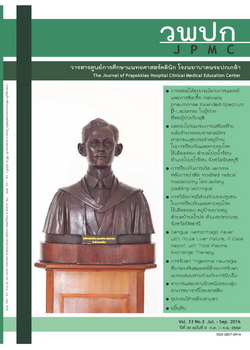ผลของโปรแกรมการเสริมสร้างพลังอำนาจของอาสาสมัครสาธารณสุขประจำหมู่บ้าน ในการป้องกันและควบคุมโรคไข้เลือดออก ตำบลโป่งน้ำร้อน อำเภอโป่งน้ำร้อน จังหวัดจันทบุรี
Main Article Content
Abstract
ที่มาของปัญหา: การเสริมสร้างพลังอำนาจเป็นกระบวนการที่ช่วยในการพัฒนาศักยภาพของบุคคล กลุ่มและชุมชนเพื่อให้สามารถพึ่งตนเองได้ ผู้วิจัยได้นำแนวคิดการเสริมสร้างพลังอำนาจมาประยุกต์ใช้เพื่อการพัฒนาศักยภาพของอาสาสมัครสาธารณสุขประจำหมู่บ้านให้เกิดพลังความเข้มแข็งในการแก้ไขปัญหาโรคไข้เลือดออกในชุมชน
วัตถุประสงค์: การวิจัยครั้งนี้มีวัตถุประสงค์เพื่อศึกษาผลของโปรแกรมการเสริมสร้างพลังอำนาจของอาสาสมัครสาธารณสุขประจำหมู่บ้านในการป้องกันและควบคุมโรคไข้เลือดออกตำบลโป่งน้ำร้อน อำเภอโป่งน้ำร้อน จังหวัดจันทบุรี
วิธีการศึกษา: ใช้รูปแบบการวิจัยกึ่งทดลอง (quasi-experimental study) ศึกษา 2 กลุ่ม มีการวัดผลก่อน และหลังการทดลอง (pretest posttest two groups design) กลุ่มตัวอย่าง ได้แก่ อาสาสมัครสาธารณสุขประจำหมู่บ้าน แบ่งเป็นกลุ่มทดลองที่เข้าร่วมโปรแกรม จำนวน 2 หมู่บ้าน รวม 25 คน และกลุ่มเปรียบเทียบ จำนวน 2 หมู่บ้าน รวม 26 คน ใช้วิธีสุ่มกลุ่มตัวอย่างเป็นกลุ่มทดลองและกลุ่มเปรียบเทียบ กลุ่มทดลองได้รับโปรแกรมการเสริมสร้างพลังอำนาจเพื่อปรับเปลี่ยนพฤติกรรมป้องกันและควบคุมโรคไข้เลือดออก ส่วนกลุ่มเปรียบเทียบมีการดำเนินงานตามปกติ คือเข้าร่วมประชุมประจำเดือน ปฏิบัติงานตามแผนงานในละแวกบ้านที่รับผิดชอบ แต่จะไม่ได้เข้าร่วมโปรแกรมการเสริมสร้างพลังอำนาจ กลุ่มทดลองได้รับกิจกรรมตามโปรแกรมการเสริมสร้างพลังอำนาจจำนวน 5 ครั้ง ระยะเวลา 11 สัปดาห์ เก็บรวบรวมข้อมูลด้วยแบบสอบถาม วิเคราะห์ข้อมูลด้วยสถิติการแจงแจงความถี่ ร้อยละ ค่าเฉลี่ย ส่วนเบี่ยงเบนมาตรฐานสถิติ paired t – test Independent t-test และ Z-test
ผลการศึกษา: ผลการวิจัยพบว่า หลังการทดลอง กลุ่มทดลองมีคะแนนเฉลี่ยความรู้เกี่ยวกับโรคไข้เลือดออกการรับรู้พลังอำนาจในการป้องกันและควบคุมโรคไข้เลือดออก การรับรู้ความสามารถของตนเองในการป้องกันและควบคุมโรคไข้เลือดออก พฤติกรรมการป้องกันและควบคุมโรคไข้เลือดออกสูงกว่าก่อนการทดลองและกลุ่มเปรียบเทียบอย่างมีนัยสำคัญทางสถิติ และค่าดัชนีบ้านที่สำรวจพบลูกน้ำยุงลาย (HI) และค่าดัชนีภาชนะที่สำรวจพบลูกน้ำยุงลาย (CI) ลดลงมากกว่าก่อนการทดลองและลดลงมากกว่ากลุ่มเปรียบเทียบอย่างมีนัยสำคัญทางสถิติ
สรุป: โปรแกรมการเสริมสร้างพลังอำนาจที่พัฒนาขึ้นด้วยการใช้กระบวนการ 5 ขั้นตอน มีระยะเวลา 11 สัปดาห์ เน้นกิจกรรมหลากหลาย มีการฝึกปฏิบัติงานในพื้นที่จริงจึงสามารถนำไป ประยุกต์ใช้ในการสร้างเสริมศักยภาพอาสาสมัครสาธารณสุขประจำหมู่บ้านในพื้นที่เพื่อการป้องกันและควบคุมโรคไข้เลือดออกต่อไป
คำสำคัญ: โปรแกรมการเสริมสร้างพลังอำนาจ อาสาสมัครสาธารณสุขประจำหมู่บ้าน การป้องกันและควบคุมโรคไข้เลือดออก
Effect of Empowerment Program on Prevention and Control of Dengue Hemorrhagic Fever among Village Health Volunteers in Pongnamron Sub-Distric, Pongnamron Distric, Chanthaburi Province
Background: Empowerment is the process that would help enhance the capability of individuals, groups and communities to conceive their self-reliance.
Objective: The researcher applied the concept of empowerment in an attempt to enhance the capability of village health volunteers for the prevention and control of dengue hemorrhagic fever (DHF) in community.
Material and Methods: This quasi-experimental study with pretest-posttest two groups design aimed to study the effect of empowerment program for prevention and control of DHF in Pongnamron Sub-district, Pongnamron District, Chanthaburi Province. Participants were village heath volunteers who were randomly selected to an experimental group
(from 2 villages, totally 25 persons) and a comparison group (from 2 villages, totally 26 persons). Participants in the experimental group were required to attend a health education program to pursue their behavioral changes for the prevention and control of DHF; whereas, those in a comparison group performed their regular duties based on traditional training and the monthly meeting without obtaining empowerment program. The experimental group attended 5-time empowerment activities in 11 weeks. Data were collected through a questionnaire and were analyzed with frequency distribution, percentage, mean, standard deviation paired t-test, independent t-test, and Z-test.
Results: Study results showed that in an experimental group, the mean scores of knowledge about DHF, perceived power in prevention and control of DHF, perceived self-efficacy in prevention and control of DHF and DHF prevention and control behaviors after the experiment were significantly higher than those before the experiment and higher than those of a comparison group. In contrast, the House Index (HI) and Container Index (CI) in the experimental group became significantly lower than those before the experiment and significantly lower than those in the comparison group.
Conclusion: As this empowerment program was thoughtfully developed and was proved its effectiveness, it could be applied to enhance DHF prevention and control capability of village health volunteers in other areas.
Keywords: Empowerment Program, Village Health Volunteers, Prevention and Control, Dengue Hemorrhagic Fever

